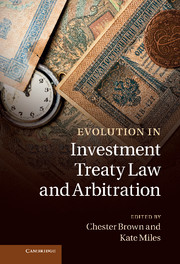Book contents
- Frontmatter
- Contents
- Contributors
- Editors' preface and acknowledgements
- Table of cases
- Table of Treaties
- Part I Introduction
- Part II Shifts in fundamental character
- Part III Actors in international investment law
- 8 Sovereign wealth funds and international investment law
- 9 Investor misconduct: Jurisdiction, admissibility or merits?
- 10 The European Union as a global investment partner: Law, policy and rhetoric in the attainment of development assistance and market liberalisation?
- 11 The ‘fair and equitable treatment’ standard and the circumstances of the host State
- 12 The plea of necessity under customary international law: A critical review in light of the Argentine cases
- 13 Making way for the public interest in international investment agreements
- 14 The participation of sub-national government units as amici curiae in international investment disputes
- Part IV The new significance of procedure
- Part V Engagement with cross-cutting issues
- Part VI Conclusions
- Index
- References
10 - The European Union as a global investment partner: Law, policy and rhetoric in the attainment of development assistance and market liberalisation?
from Part III - Actors in international investment law
Published online by Cambridge University Press: 05 December 2011
- Frontmatter
- Contents
- Contributors
- Editors' preface and acknowledgements
- Table of cases
- Table of Treaties
- Part I Introduction
- Part II Shifts in fundamental character
- Part III Actors in international investment law
- 8 Sovereign wealth funds and international investment law
- 9 Investor misconduct: Jurisdiction, admissibility or merits?
- 10 The European Union as a global investment partner: Law, policy and rhetoric in the attainment of development assistance and market liberalisation?
- 11 The ‘fair and equitable treatment’ standard and the circumstances of the host State
- 12 The plea of necessity under customary international law: A critical review in light of the Argentine cases
- 13 Making way for the public interest in international investment agreements
- 14 The participation of sub-national government units as amici curiae in international investment disputes
- Part IV The new significance of procedure
- Part V Engagement with cross-cutting issues
- Part VI Conclusions
- Index
- References
Summary
Introduction
The European Union's (EU) interest and involvement in foreign direct investment (FDI) is by no means new. However, it has only been comparatively recently that one has been able to begin to distinguish the particularities of a specific EU approach to FDI, especially when placed within a broader developmental context. The approach has been most visible during the ongoing negotiations of Economic Partnership Agreements (EPAs) with the African, Caribbean and Pacific (ACP) grouping of States. Though the EU–ACP relationship is often promoted (by the EU) as a model of mutual and benign co-operation between economically divergent States, the relationship highlights, in fact, political and normative challenges for both sides. In particular, whereas the EU has sought to utilise its links with the ACP countries to fashion a uniquely global role for itself, practice suggests this relationship is much more problematic for both. And what has in the past proved true for trade, is proving equally true in relation to FDI.
This chapter seeks to critically address the role of the EU as a global investment actor, with particular focus on the supposed synergies between FDI as a development assistance tool and FDI as a means to promote market liberalisation. This is especially significant as the entry into force of the Treaty of Lisbon in December 2009 has, for the first time, introduced the first explicit reference to foreign investment in the EU's treaty arrangements. While the grant of competence to the EU in this area will provide a clearer mandate for action, it fails to resolve the overarching question as to its purpose. The chapter thus focuses on one particular aspect of this broader debate, namely, the negotiation of investment provisions within EPAs, with particular comment on the investment provisions of the 2008 EPA negotiated between the EU and the Caribbean States. In devising the rules on investment, the final text is innovative in numerous respects, though whether the investment liberalisation attained will also provide the stated developmental benefits is more contested. The chapter concludes by noting the unique range of pressures exerted on the EU in framing co-ordinated policies in the areas of FDI and development; thus, while the EU's rhetoric is often extremely positive on such issues, its capacity to implement them – and implement them fully and in an integrated manner – is invariably subject to the risk of incoherence and fragmentation.
- Type
- Chapter
- Information
- Evolution in Investment Treaty Law and Arbitration , pp. 201 - 222Publisher: Cambridge University PressPrint publication year: 2011
References
- 2
- Cited by

